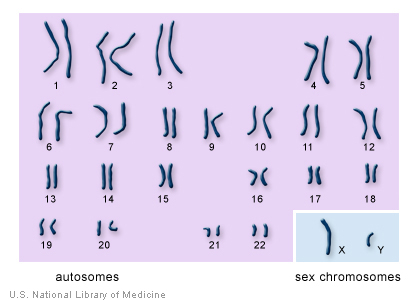
Human Chromosomes
The human chromosome is the basic building block of life and is one of the most important components of the cell to be transmitted from generation to generation. It is essentially an organized structure of DNA that exists within the nucleus of all human cells and comprises a single chain of DNA that is coiled and super coiled to form dense thread like pieces.
Like all other eukaryotes, humans contain a fixed number of chromosomes within each of the nuclei in all their cells. There are essentially two types of chromosomes as characterized by karyotyping at the metaphase of cell division. These include:
Autosomes - There are 22 pairs of autosomes in humans. These code for most of the genetic traits in the body.
Gonosomes or sex chromosomes - Humans contain two types of sex chromosomes including X and Y. While males have an X and a Y chromosome, females possess two X chromosomes.

The 22 autosomes are numbered by size. The other twochromosomes, X and Y, are the sex chromosomes. This picture of the human chromosomes lined up in pairs is called a karyotype. Image Credit: U.S. National Library of Medicine
Each human cell thus contains 46 chromosomes in 23 pairs. The gametes or ovum produced by the female ovaries and the sperm produced by the male testicles, however, contain only 23 chromosomes. This ensures that when the egg and the sperm get fertilized to form a baby, it contains 23 pairs and restores the total chromosomal count to 46.
Apart from chromosomes present in the nuclei, humans also possess hundreds of copies of the mitochondrial genome, present in the mitochondria of cells. Mitochondria are normally responsible for generating the energy required by the cell to perform functional processes.
Each of the chromosomes contains highly condensed and coiled DNA consisting of millions of gene sequences. While some of the sequences are essential for life and code for essential proteins, some are "silent," meaning they do not code for any proteins. The complete human genome database is being compiled based on the Sanger Institute's human genome information in the Vertebrate Genome Annotation (VEGA) database.
| Chromosome | Genes | Total bases | Sequenced bases |
| 1 | 4,220 | 247,199,719 | 224,999,719 |
| 2 | 1,491 | 242,751,149 | 237,712,649 |
| 3 | 1,550 | 199,446,827 | 194,704,827 |
| 4 | 446 | 191,263,063 | 187,297,063 |
| 5 | 609 | 180,837,866 | 177,702,766 |
| 6 | 2,281 | 170,896,993 | 167,273,993 |
| 7 | 2,135 | 158,821,424 | 154,952,424 |
| 8 | 1,106 | 146,274,826 | 142,612,826 |
| 9 | 1,920 | 140,442,298 | 120,312,298 |
| 10 | 1,793 | 135,374,737 | 131,624,737 |
| 11 | 379 | 134,452,384 | 131,130,853 |
| 12 | 1,430 | 132,289,534 | 130,303,534 |
| 13 | 924 | 114,127,980 | 95,559,980 |
| 14 | 1,347 | 106,360,585 | 88,290,585 |
| 15 | 921 | 100,338,915 | 81,341,915 |
| 16 | 909 | 88,822,254 | 78,884,754 |
| 17 | 1,672 | 78,654,742 | 77,800,220 |
| 18 | 519 | 76,117,153 | 74,656,155 |
| 19 | 1,555 | 63,806,651 | 55,785,651 |
| 20 | 1,008 | 62,435,965 | 59,505,254 |
| 21 | 578 | 46,944,323 | 34,171,998 |
| 22 | 1,092 | 49,528,953 | 34,893,953 |
| X (sex chromosome) | 1,846 | 154,913,754 | 151,058,754 |
| Y (sex chromosome) | 454 | 57,741,652 | 25,121,652 |
| Total | 32,185 | 3,079,843,747 | 2,857,698,560 |
Sources
- www.ecologia.unam.mx/.../bendich%202000.pdf
- web.udl.es/.../euchromosomes.pdf
- http://www.biologymad.com/resources/RevisionM5Cell%20Division.pdf
- smcg.ccg.unam.mx/.../cromosomeStructure.pdf
- http://www.csun.edu/~cmalone/pdf360/Ch08-1%20struct.pdf
- www.genetics.edu.au/.../Genes%20and%20Chromosomes%20-%20The%20Genome
Further Reading
Last Updated: Aug 23, 2018

































No hay comentarios:
Publicar un comentario